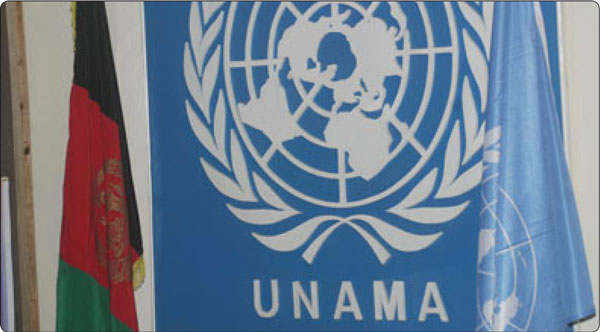The UN Assistance Mission in Afghanistan (UNAMA)welcomes the coming into force of Afghanistan’s new penal code, a milestone in thecountry’s criminal justice reform and a vital part of efforts to strengthen the rule of law.
Publish dateThursday 22 February 2018 - 10:53
Story Code : 158721
With the new penal code, Afghanistan has for the first time a comprehensive criminal code,
complying with international treaty obligations in criminal justice and incorporating modern
best practices in criminology.
Together with international partners and experts from UN agencies, UNAMA supported
Afghan authorities in drafting the code. UNAMA will continue dialogue with stakeholders so
that the application of the new code does not result in impunity gaps and in particular that
there is a robust legal framework in place to protect women from violence.
The new Penal Code, which entered into force on 14 February, reinforces Afghanistan’s
compliance with international human rights and criminal justice standards. It incorporates all
mandatory crimes under the United Nations Convention against Corruption, the UN
Convention against Transnational Organized Crimes (UNTOC) and its three protocols. It
also incorporates the Rome Statute of the International Criminal Court covering war crimes,
crimes against humanity and genocide, and establishes command responsibility for those
who fail to prevent or punish subordinates who commit these crimes. The code expands the
definition of the crime of torture in Afghan law to comply with the internationally accepted
definition set out in the Convention against Torture. It responds to reform needs by codifying
the crime of bacha bazi, land usurpation, the submission of incorrect asset declarations by
public officials, and criminalizes forced virginity testing, a practice prevalent within law
enforcement agencies.
Reforming the sanctions regime, the code introduces alternatives to imprisonment, which the
judges have the discretion to impose when sentencing to terms of imprisonment below five
years, and have to mandatorily impose if the incarceration is less than three months.The
new Penal Code also significantly reduces the number of crimes for which the death penalty
applies.
The coming into force of the Penal Code will bring significant positive developments and a
real potential to trigger societal transformation. The removal of the chapter penalizing
violence against women, however, causes concern with regard to ensuring the strongest
possible legal protection of women. Technical amendments to the Code will be essential to
ensure that the criminal provisions of the Law on the Elimination of Violence Against Women
(the EVAW Law) still apply. UNAMA notes that the current EVAW law remains in place and
continues to provide overall legal protection for women, and remains committed to facilitating
dialogue on ways to strengthen the criminalization of violence against women.
UNAMA looks forward to the full implementation of the revised Penal Code, with a view to
achieving accountability for those who violate national and international laws.
complying with international treaty obligations in criminal justice and incorporating modern
best practices in criminology.
Together with international partners and experts from UN agencies, UNAMA supported
Afghan authorities in drafting the code. UNAMA will continue dialogue with stakeholders so
that the application of the new code does not result in impunity gaps and in particular that
there is a robust legal framework in place to protect women from violence.
The new Penal Code, which entered into force on 14 February, reinforces Afghanistan’s
compliance with international human rights and criminal justice standards. It incorporates all
mandatory crimes under the United Nations Convention against Corruption, the UN
Convention against Transnational Organized Crimes (UNTOC) and its three protocols. It
also incorporates the Rome Statute of the International Criminal Court covering war crimes,
crimes against humanity and genocide, and establishes command responsibility for those
who fail to prevent or punish subordinates who commit these crimes. The code expands the
definition of the crime of torture in Afghan law to comply with the internationally accepted
definition set out in the Convention against Torture. It responds to reform needs by codifying
the crime of bacha bazi, land usurpation, the submission of incorrect asset declarations by
public officials, and criminalizes forced virginity testing, a practice prevalent within law
enforcement agencies.
Reforming the sanctions regime, the code introduces alternatives to imprisonment, which the
judges have the discretion to impose when sentencing to terms of imprisonment below five
years, and have to mandatorily impose if the incarceration is less than three months.The
new Penal Code also significantly reduces the number of crimes for which the death penalty
applies.
The coming into force of the Penal Code will bring significant positive developments and a
real potential to trigger societal transformation. The removal of the chapter penalizing
violence against women, however, causes concern with regard to ensuring the strongest
possible legal protection of women. Technical amendments to the Code will be essential to
ensure that the criminal provisions of the Law on the Elimination of Violence Against Women
(the EVAW Law) still apply. UNAMA notes that the current EVAW law remains in place and
continues to provide overall legal protection for women, and remains committed to facilitating
dialogue on ways to strengthen the criminalization of violence against women.
UNAMA looks forward to the full implementation of the revised Penal Code, with a view to
achieving accountability for those who violate national and international laws.
Source : Afghan Voice Agency(AVA)
avapress.net/vdcdxj0ffyt0k56.em2y.html
Top hits







